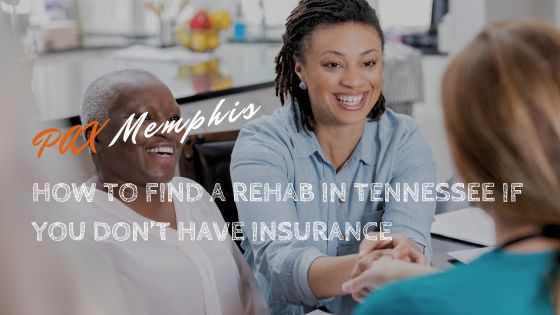Drug and alcohol abuse are complex conditions that require comprehensive treatment and continuing support. The effects of an untreated addiction can be devastating: mental and physical health harm, legal and financial trouble, relationship difficulties, and more.
While the effects of addiction are often life-altering, many people do not seek the treatment they need to overcome it and work toward lifelong sobriety. In fact, only about 1 in 11 people with addiction will get substance abuse treatment.
Many barriers can keep people from seeking treatment when they desperately need it. Concern about paying for rehab without insurance is one of the most significant barriers between addicted people and the treatment they need.
Fortunately, there are many ways to find treatment if you don’t have insurance. This article will explore some of the best ways to go to rehab without insurance in Tennessee. Reach out to the team at PAX Memphis to learn more about our accessible substance abuse treatment programs or to find support at any stage of your recovery from addiction.
How to Find Rehab in Tennessee Without Insurance
Addiction is a costly disease. In addition to the price of drugs and alcohol, people living with addiction may face unemployment, loss of a job, housing insecurity, and the loss of many future opportunities. People may face serious, sometimes life-altering legal or financial challenges that threaten their security.
Getting addiction treatment is the best way to get your life back on track, prevent further harm, and begin to build a healthier future. However, many people may have concerns about paying for rehab. These concerns are even greater for those without insurance.
Fortunately, there are several ways to find rehab in Tennessee without insurance. Here are some of the ways you can get the help you need to put substance abuse behind you and move forward into a healthier, sober future.
Emergency care
Substance abuse and addiction can have devastating, sometimes life-threatening complications, including overdose. If you or someone near you is experiencing severe medical difficulties related to substance abuse or an overdose, you must seek immediate medical care. Call 911 or go to your nearest emergency department right away. Medical staff will provide life-saving care whether or not you are insured.
Check insurance coverage
Insurance plans provide different levels of care for different services, but the Affordable Care Act (ACA) requires all plans to cover some or all expenses related to mental health and addiction treatment. If you believe your insurance does not cover rehab, consult your insurance provider to learn what services, programs, and providers are covered under your specific plan.
Apply for TennCare
If you live in Tennessee, you may be eligible to apply for TennCare, a state health insurance program for vulnerable and low-income residents. There are plans available for individuals and families. Apply easily by visiting www.tenncareconnect.tn.gov.
Attend state-funded rehab
State-funded rehab facilities provide all levels of care to help people living with drug and alcohol addiction. People may attend:
- Inpatient or residential treatment
- Detox programs
- Outpatient treatment
- Recovery support services
Contact your state’s mental health or substance abuse agency to learn about available state-funded rehab programs.
Apply for scholarships and grants
Some addiction treatment centers and community organizations provide grants and scholarships to help uninsured people cover the cost of rehab. The Substance Abuse and Mental Health Services Administration (SAMHSA) website has application guidelines and available scholarship and grant money. You may also contact your local treatment center to ask if grants or scholarships are available.
Sliding-scale treatment
Treatment staff understand the importance of getting help and believe that rehab is essential for everyone, regardless of income. Many treatment centers offer sliding-scale treatment, meaning the cost of rehab is adjusted to fit each person’s budget.
Payment plans
Banks and rehab facilities often offer financing options to help people afford rehab without insurance. Setting up a payment plan allows people to quickly get the help they need. After completing treatment, people make affordable monthly payments until their balance is paid off.
Low-interest credit cards
Some people choose to pay for rehab with low or no-interest credit cards. This helps people get into treatment quickly and delay paying for rehab until they are stabilized, healthy, and sober.
Savings
If you have substantial savings or a 401k, you may use these funds to get into rehab immediately, even if you do not have current insurance coverage.
Asking for help
Friends and family members often want to help an addicted loved one but do not know what steps to take. You may consider asking concerned loved ones to help you pay for rehab if you do not have insurance, either directly or through crowdfunding websites.
Many who struggle with addiction focus on the cost of rehab–but addiction itself is very expensive. Untreated addiction costs a lot, both in actual money and in time, memories, health, and lost opportunities. If you need to go to rehab but do not have insurance, you can still get the help you need to take back control over your health and future.
Find Help Now
Don’t let a lack of health insurance keep you from getting help to address drug and alcohol addiction. Reach out to the PAX Memphis specialists now to learn about our comprehensive treatment plans and how to make rehab affordable for any budget.
Medically Reviewed: September 25, 2019

All of the information on this page has been reviewed and verified by a certified addiction professional.










